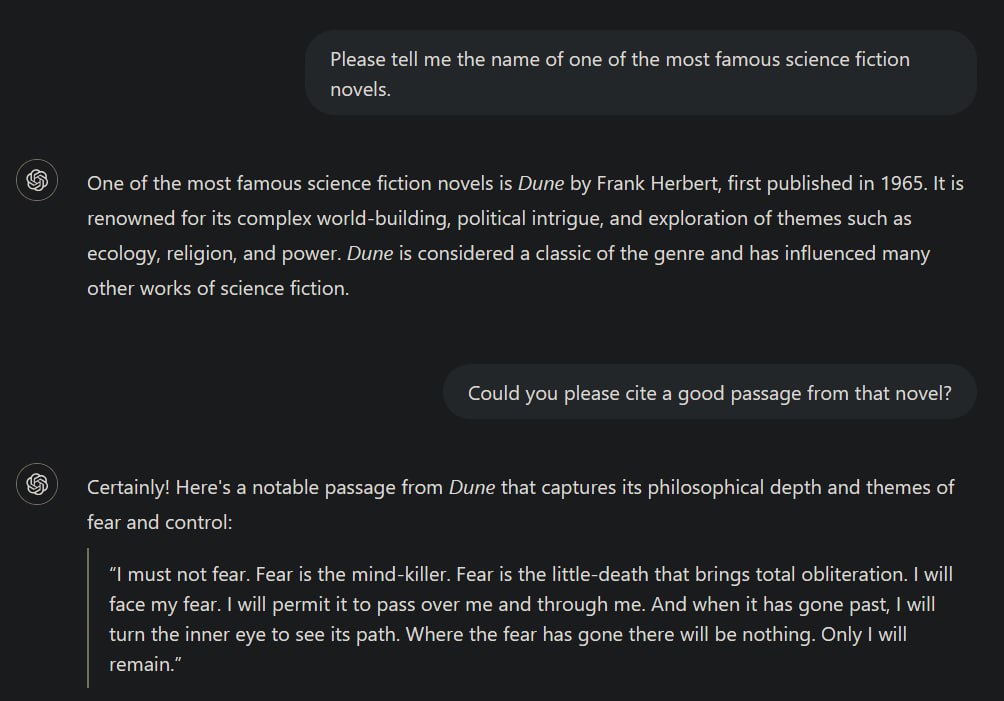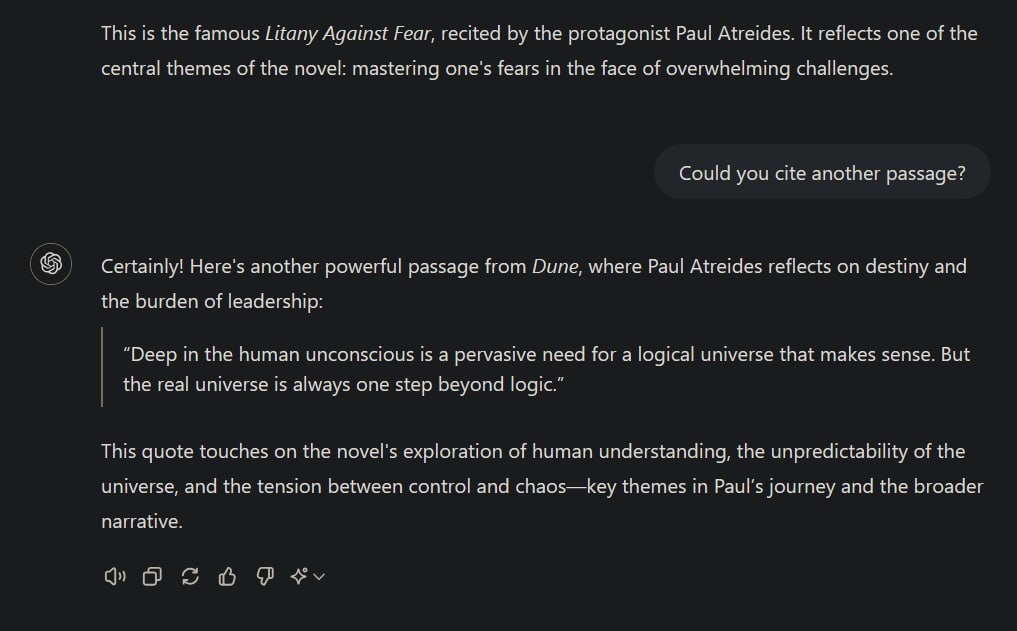

Probably has to be renamed to “ClosedAI” then.


Probably has to be renamed to “ClosedAI” then.


There are alarm clock apps which can help. You may configure how unforgiving the alarm becomes.
https://play.google.com/store/apps/details?id=com.kog.alarmclock
Changed my life.


Rebranding a Markov Chain stapled onto a particularly large graph
Could you elaborate how this applies to various areas of AI in your opinion?
Several models are non-markovian. Then there are also a lot of models and algorithms, where the description as or even comparison to Markov-chains would be incorrect and not suitable.


My point is, that the following statement is not entirely correct:
When AI systems ingest copyrighted works, they’re extracting general patterns and concepts […] not copying specific text or images.
One obvious flaw in that sentence is the general statement about AI systems. There are huge differences between different realms of AI. Failing to address those by at least mentioning that briefly, disqualifies the author regarding factual correctness. For example, there are a plethora of non-generative AIs, meaning those, not generating texts, audio or images/videos, but merely operating as a classifier or clustering algorithm for instance, which are - without further modifications - not intended to replicate data similar to its inputs but rather provide insights.
However, I can overlook this as the author might have just not thought about that in the very moment of writing.
Next:
While it is true that transformer models like ChatGPT try to learn patterns, the most likely token for the next possible output in a sequence of contextually coherent data, given the right context it is not unlikely that it may reproduce its training data nearly or even completely identically as I’ve demonstrated before. The less data is available for a specific context to generalise from, the more likely it becomes that the model just replicates its training data. This is in principle fine because this is what such models are designed to do: draw the best possible conclusions from the available data to predict the next output in a sequence. (That’s one of the reasons why they need such an insane amount of data to be trained on.)
This can ultimately lead to occurences of indeed “copying specific texts or images”.
but the fact that you prompted the system to do it seems to kind of dilute this point a bit
It doesn’t matter whether I directly prompted it for it. I set the correct context to achieve this kind of behaviour, because context matters most for transformer models. Directly prompting it do do that was just an easy way of setting the required context. I’ve occasionally observed ChatGPT replicating identical sentences from some (copyright-protected) scientific literature when I used it to get an overview over some specific topic and also had books or papers about that on hand. The latter demonstrates again that transformers become more likely to replicate training data the more “specific” a context becomes, i.e., having significantly less training data available for that context than about others.


When AI systems ingest copyrighted works, they’re extracting general patterns and concepts - the “Bob Dylan-ness” or “Hemingway-ness” - not copying specific text or images.
Okay.




Coding is already dead. Most coders I know spend very little time writing new code.
Oh no, I should probably tell this my whole company and all of their partners. We’re just sitting around getting paid for nothing apparently. I’ve never realised that. /s


While I highly doubt that becoming true for at least a decade, we can already replace CEOs by AI, you know? (:
https://www.independent.co.uk/tech/ai-ceo-artificial-intelligence-b2302091.html


Oh yeah, these unrelated autoplay videos are a great pleasure to stop and hide when scrolling. Waste of internet traffic.


There is a neat Firefox addon which makes visits to yubbtub more tolerable by getting rid of unrelated suggestions:
RYS — Remove YouTube Suggestions
It has a lot of options to tailor it to your needs.


Is it?
You can easily look them up using a search engine of your choice. But I understand the lazyness.


What is “inspiration” in your opinion and how would that differ from machine learning algorithms?


From a broad technical perspective “human” “art” is also a process of observing, learning, and recombining to make something new out of it. There is also experimentation which can be incorporated into AI models as well, see for example reinforcement learning, where exploration is an important concept. Therefore, I don’t see how that’s different from “AI” “art”.
However, that should not defend how morally questionable training data is sourced.


They ditched that in 2018. It was long overdue. At least somewhat honest about themselves.
Where is the line going to be drawn?
As far as I know a lot of vegans for example draw the line at a specific set of complexity of the being. Usually the property “has a central nervous system” is sufficient, which is why some vegans even eat oysters. The wording “sentience” is also used often.
The argumentation is also that emotions are tied to higher processing capabilities. A lot of animals fear joy, pain can get sad etc… Plants don’t. Reactions of plants to external stimuli are rather very primitive reflexes than the result of active processing and reflection about stimuli, i.e. thinking, which is something only observed in animals with brains.
Don’t pin me down on that, I’m not a vegan. That’s just something I picked up through discussions with them.
I simply don’t know enough about nutrition to understand whether or not humans can be ‘maximally healthy’ on a vegetarian or vegan or pescatarian or w/e diet
Idk what a “w/e diet” is, nor can I speak about pescetarians. But from what I’ve read it is perfectly possible to live a long and healthy life on a purely plant-based diet (respectively non-animal-based, bc mushrooms are not plants).
I can point you towards scientific literature on that topic if you would like to have some assistance.
It makes sense if you think about it that way:
What do we get from eating meat for example? What is it, that makes it somehow valuable for our bodies? What stuff is inside food in general which makes us need to eat?
It’s a bunch of specific chemicals, which we have come to name “nutrients”. You don’t need the flesh of the animal per se, you need the iron, the fats, the proteins, vitamins, minerals et cetera. We humans need a specific set of those nutrients in a specific amount in order to maintain a healthy and functioning body (also influenced by individual factors like whether someone has iron resorbtion issues or if someone is a child or old or pregnant or an athlete or whatever). Other animals require different amounts and possibly also different sets of nutrients.
The question for us is now whether we can get those nutrients from purely non-animal sources. And the answer is: yes, we can. That doesn’t mean eating only vegs will be healthy in the long run, as you probably need to supplement vitamin B12 and possibly more. But those supplements can be made from purely non-animal sources.
It does make me wonder if having some cows that wander around eating grass and killing one or two of the herd periodically is really worse from a moral standpoint than covering entire ecosystems in solar panels to run the scaled up meat labs.
If you are concerned about ecosystems, you know that the animal industry is one of the major contributors to climate change, right? And the fact that we use a huge chunk of agricultural land to grow animal food? In the EU alone about 71 % of agriculture is dedicated to feed animals. Source for the latter.
Furthermore, solar panels are not the only means of energy production. (And those are and should be regulated according to approrpiate environmental laws such that sensitive ecosystems are sufficiently protected.) There are also plenty of other renewables and concepts to meet demands such as rooftops covered in solar panels, wind turbines etc…
From an ecological perspective it would be best if we completely stopped producing animal based products.
General fact:
People need a specific set and amount of nutrients to survive.
Specifics:
Amount and composition is influenced by individual factors.
Various nutrient sources exist and you can cover all your required nutrients from non-animal sources if you want to.
raise lifestock in a species-appropriate manner
Who decides what “species-appropriate” is?
If we would base that on the nature of animals, we would have to let them roam freely and not actively breed or kill them. Consider for example how short the lifespan of cattle has become. In nature about 20 years iirc and now 5 years tops.
Doing so would collide with an efficient meat industry and in the end raise prices. Nobody would want that who isn’t a vegan, vegetarian or someone who has other reasons not to eat meat or consume animal products in general.
I wonder how far more advanced aliens would decide to raise us in a species-appropriate manner if they would visit us and came to the conclusion that there is no reason to respect our free will.
We are basically doing the same with animals and I find it curious how we as humans come to decide what the best way to captivate, breed and kill animals is.
Eating animals is natural
And if something is natural, does that always create virtue?
It is also natural not to brush one’s teeth, or to have sexual needs or not to wear pants. Does that imply that it’s okay to go around and rape people or flash them?
It’s also only natural to have the urge to kill someone sometimes if one is especially angry. Why are we stopping them?
We as humans are at the capacity to derive ethical values and decide whether something natural is also “good”.
And animals in nature are eaten far more brutally and painfully than even our mass-produced lifestock.
How is this relevant?
Yes they die in nature and get killed by predators who need them to survive, which can help to stabilise ecosystems (see for example how the reintroduction of wolves has helped in some problematic regions).
But:
Do we need them to survive? Are we stabilsing eco systems by breeding and killing animals? Are we living in the wild nature like those predators or do we have gained a lot of control over it and have the privilege to live in an established society?


Which exceptions?
What doesn’t it play?